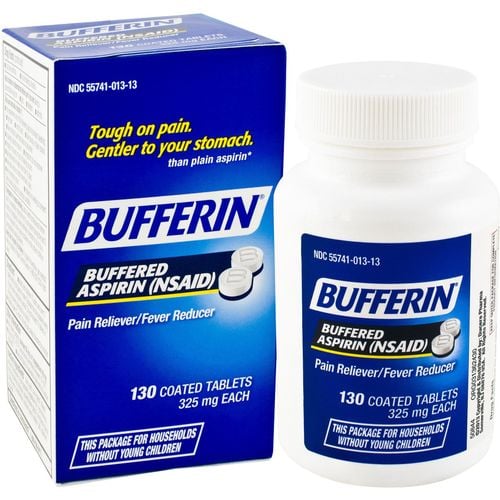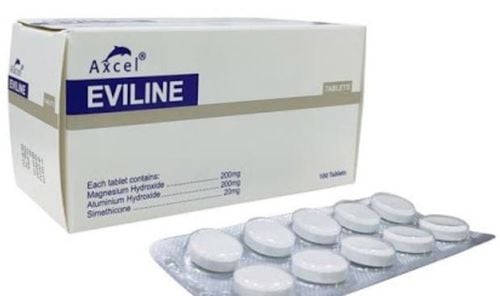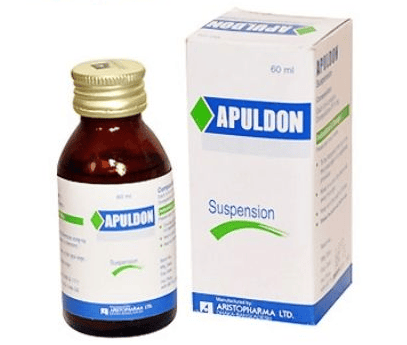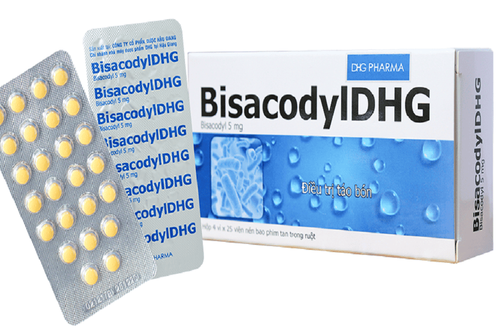This is an automatically translated article.
Apbezo is an antacid, anti-reflux & anti-peptic ulcer drug of ACME Formulation Pvt. Ltd. - India. For more specific information about this drug, let's learn through the following article.
1. What is Apbezo?
Apbezo has the main ingredient is rabeprazole 20 mg, in addition, in the composition of the drug, there are excipients just enough for 1 tablet. Apbezo 20mg is available in the form of enteric coated tablets. Packed in a box of 3 blisters x 10 tablets.
Pharmacodynamics of Rabeprazole:
Rabeprazole belongs to the class of antisecretory drugs, which prevents gastric secretion by inhibiting gastric H+/K+ ATPase at the secretory surface of gastric parietal cells. Because the enzyme H+/K+ ATPase is considered an acid (proton) pump located in the parietal cells of the stomach, rabeprazole has properties as a gastric proton pump inhibitor. Rabeprazole works to block the last stage of gastric secretion. Rabeprazole Pharmacokinetics
Absorption: After a 20 mg oral dose, rabeprazole is absorbed and can be recovered in plasma after 1 hour. The absolute bioavailability of rabeprazole after 20 mg oral administration is approximately 52% (compared to intravenous administration). Distribution: About 96.3% of rabeprazole when entering the body bound to plasma proteins. Metabolism: Rabeprazole is extensively metabolised after administration, the main metabolites being thioether and sulphon with no antisecretory activity. In vitro studies have shown that rabeprazole is metabolized primarily by the liver by cytochrome P450 3A and 2C19 enzymes. Elimination: Following oral administration of 20 mg rabeprazole, approximately 90% of the drug is excreted in the urine, with the remainder recovered in the feces (as metabolites).
2. What are the uses of Apbezo?
Apbezo drug 20mg is indicated in the following cases:
Treatment of pathological conditions of increased acid secretion including Zollinger - Ellison syndrome Short-term treatment of esophagitis associated with gastric reflux - esophagus (GERD).
3. Usage and dosage of Apbezo
3.1.How to use Apbezo drug Apbezo drug is taken orally. The patient should swallow the tablet whole, do not chew or crush the tablet before taking it. Take the medicine one hour before breakfast. It is necessary to exclude the possibility of malignancy in patients with peptic ulcer before taking the drug, because the drug can mask the symptoms of the disease, leading to delay in the detection and treatment of the disease.
3.2. Dosage Patients need to follow the doctor's instructions and the instructions for use on the package of the drug. The recommended basic dosage is as follows:
Take 10-20mg/time x 1 time/day.
Duration of treatment course:
Duodenal ulcer use for 4 - 8 weeks, Gastric ulcer and reflux esophagitis use the drug for 6 - 12 weeks. It should be noted that long-term treatment is limited, except for treatment of Zollinger-Ellison syndrome.
3. How to handle missed dose or overdose in the process of using Apbezo
What to do when forgetting a dose of Apbezo?
Take the missed dose as soon as you remember. Skip the missed dose of Apbezo if it is almost time for your next dose and take your next dose as scheduled. What to do in case of an overdose of Apbezo?
Currently, there have been no reports of clinical overdose cases when using Apbezo for treatment. In case of accidental overdose of Apbezo and adverse side effects appear, the patient should be taken to the nearest medical facility for timely diagnosis and treatment. There is still no specific antidote for this case, so symptomatic treatment combined with measures to improve the patient's condition is essential.
4. Contraindications when using Apbezo
Do not use Apbezo drug with the following subjects:
People who are allergic or hypersensitive to any ingredient of Apbezo drug. Children. Pregnant women. Breastfeeding mothers.
5. Undesirable effects during the use of Apbezo
When using Apbezo medicine, you may experience the following undesirable effects:
Whole body: pain, fatigue, discomfort, fever, abdominal distension. Cardiovascular: palpitations, chest pain or tightness, increased or decreased heart rate, increased blood pressure, peripheral edema. Gastrointestinal: Liver diseases including liver failure (rare), increased AST (SGOT), increased ALT (SGPT), increased alkaline phosphate, increased bilirubin (jaundice), anorexia, flatulence, colon irritation , stool discolouration, esophageal candidiasis, dry mouth, atrophy of the mucous membrane of the tongue. Metabolism/nutrition: Hypoglycemia, weight gain. Muscles: Muscle pain, cramps, joint pain, leg pain. Nervous system: Psychological disorders including depression, impatience, hallucinations, insomnia, restlessness, tremors, daydreams, anxiety, abnormal dreams, paresthesia, dysesthesia... Respiratory: Sore throat, nosebleed. Skin: Dermatitis, rash, urticaria, angioedema, itching, hair loss, dry skin, hyperhidrosis. Genitourinary: Urinary tract infection, pyuria, urinary frequency, proteinuria, increased serum creatinine, diabetes, testicular pain, gynecomastia in male patients. Hematology: Agranulocytosis in a male over 65 years of age with diabetes receiving multiple drugs with rabeprazole. The relationship between rabeprazole and agranulocytosis has not been well reported. Pancytopenia, decreased platelet and neutrophil counts, leukocytosis, hemolytic anemia. When experiencing side effects of the drug, the patient should stop using the drug and notify the doctor or go to the nearest medical facility for timely treatment.
6. Interaction of Apbezo with other drugs
When used in combination with Apbezo and Digoxin may increase the blood concentration of digoxin due to increased absorption of this substance. Concomitant administration of Apbezo with aluminum-containing antacids or magnesium hydroxide is not recommended because they may reduce the bioavailability of these drugs. To ensure safety, avoid adverse drug interactions, the patient needs to inform the doctor about all the medicines you are taking.
7. Notes when using Apbezo
Do not use for pregnant women and nursing mothers because safety has not been established in this population. When driving and operating machines: The drug can cause headaches, dizziness, affect the ability to drive and use machines, so caution should be taken. Store Apbezo in the manufacturer's packaging in a dry place, at room temperature below 30°C, away from direct light. Keep out of reach of children and pets.
Apbezo is an antacid, anti-reflux & anti-peptic ulcer drug of ACME Formulation Pvt. Ltd. - India. To ensure effective treatment and avoid unwanted side effects, patients need to strictly follow the instructions of the doctor, professional pharmacist.
Follow Vinmec International General Hospital website to get more health, nutrition and beauty information to protect the health of yourself and your loved ones in your family.
Please dial HOTLINE for more information or register for an appointment HERE. Download MyVinmec app to make appointments faster and to manage your bookings easily.













